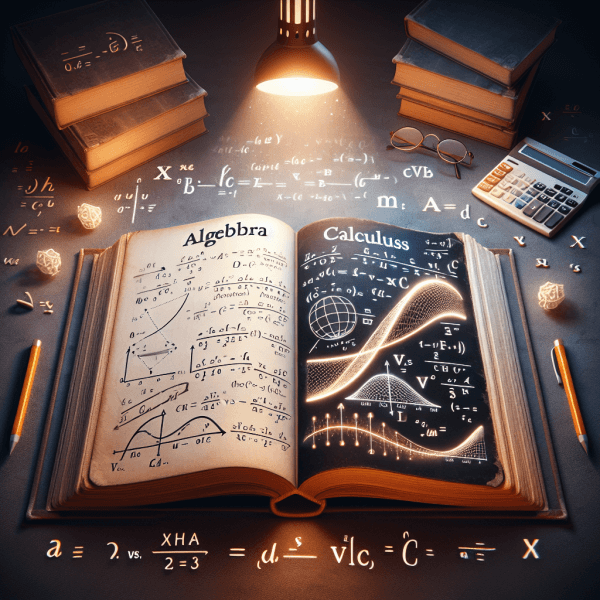Introduction
Mathematics is an expansive field that encompasses various branches, each serving unique purposes and utility. Among these branches, calculus and algebra are two foundational disciplines that play critical roles in both theoretical and applied mathematics. This essay explores the differences between calculus and algebra, illustrating their distinct concepts, methodologies, and applications.
Definitions
Algebra is a branch of mathematics dealing with symbols and the rules for manipulating those symbols. It focuses primarily on the relationships and operations between mathematical entities through variables, constants, and the basic arithmetic operations of addition, subtraction, multiplication, and division. Algebra is foundational for solving equations and understanding abstract mathematical concepts.
Calculus, on the other hand, is a branch of mathematics that deals with rates of change (differentiation) and the accumulation of quantities (integration). It is concerned with concepts such as limits, functions, derivatives, integrals, and infinite series. Calculus is often used to analyze dynamic systems and change, enabling a more comprehensive understanding of real-world phenomena.

Key Differences
1. Focus and Scope
While algebra primarily focuses on the manipulation of symbols and solving equations, calculus delves into understanding change and motion. The scope of algebra is often limited to static mathematical relationships, while calculus extends to dynamic processes and models.
2. Fundamental Concepts
In algebra, fundamental concepts include:
- Variables (e.g., x, y)
- Constants (e.g., numbers)
- Operations (addition, subtraction, multiplication, division)
- Expressions and equations (e.g., 2x + 3 = 7)
Calculus introduces additional fundamental concepts, such as:
- Limits (e.g., the limit of a function as x approaches a value)
- Derivatives (e.g., the rate of change of a function)
- Integrals (e.g., the area under a curve)
- Functions (e.g., continuous, discontinuous)
3. Applications
Algebra finds applications in various fields, including:
- Finance (calculating interest rates)
- Engineering (solving for unknowns in design equations)
- Computer science (developing algorithms)
- Everyday problem-solving (budgeting, planning)
Calculus is heavily utilized in advanced fields such as:
- Physics (analyzing motion, forces)
- Economics (determining marginal cost and marginal revenue)
- Biology (modeling population growth)
- Engineering (understanding systems dynamics)
Example Usage
To illustrate their differences through practical examples:
Algebra: A simple algebraic equation, such as 3x + 5 = 20, demonstrates the use of algebraic manipulation to solve for the variable x. Solving gives x = 5.
Calculus: In calculus, one might consider a function representing the position of an object over time, s(t) = 4t^2 + 3t. To find the instantaneous velocity of the object at any time t, one would calculate the derivative, v(t) = ds/dt = 8t + 3.
Conclusion
In summary, algebra and calculus serve different but complementary purposes within the field of mathematics. While algebra provides the essential tools for solving equations and manipulating variables, calculus expands upon these tools to address issues of change and accumulation. Understanding the distinctions between these two branches is crucial for anyone seeking to grasp the depths of mathematical theory and its applications.








Have a discussion about this article with the community:
Report Comment
We're doing our best to make sure our content is useful, accurate and safe.
If by any chance you spot an inappropriate comment while navigating through our website please use this form to let us know, and we'll take care of it shortly.
Attachment
You need to be logged in to favorite.
Log In